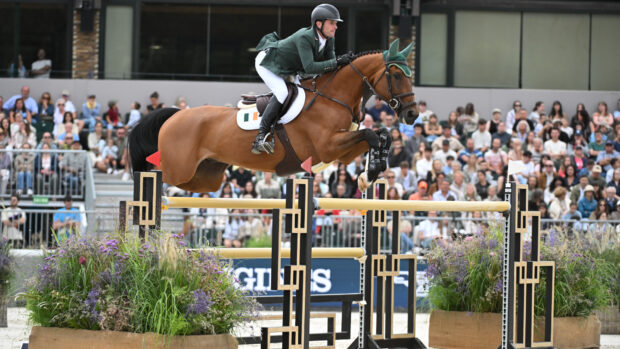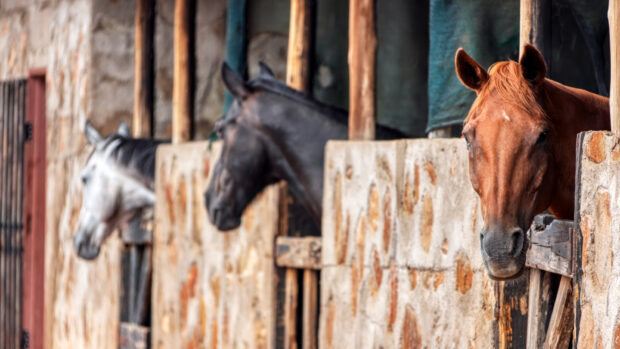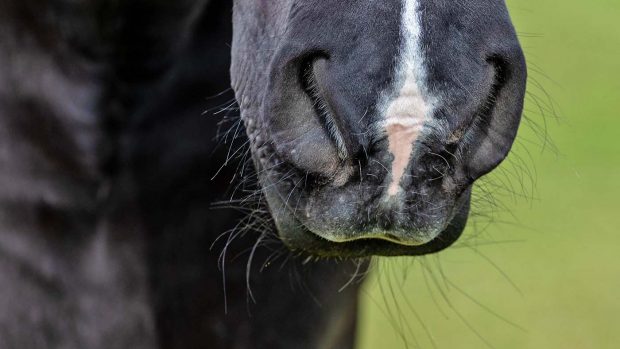Would it be fair to punish riders for bad behaviour by their support crew? That was the question put to the equestrian world’s decision-makers as the FEI seeks to overhaul its legal system.
The suggestion was mooted as the FEI tries to find a way to reprimand those who behave badly or are abusive to officials, but are not themselves competing under FEI rules.
In theory, this would mean a rider could find themselves with a ban for their parents’ obnoxious behaviour towards an official.
“Sometimes it is reported to us that parents or somebody within a [rider’s] support personnel who is not necessarily registered with the FEI has perhaps been verbally abusing an official for taking a decision against their child or a person they are coaching,” explained FEI deputy legal director Áine Power.
“The thing we struggle with is how we can discipline or sanction that person when they are not FEI registered. Sometimes at the bigger events they are accredited and we can try to get at them that way, but it is still not ideal.
“I think we can all agree that this kind of conduct has no place in our sport and a strong message needs to be sent out to parents that no matter how involved and invested they are in their child’s performance, it is never ok to abuse or take out that excitement on an official.”
Ms Power stressed this was “very much just a proposal”.
“We know in some cases this [issuing a yellow card] can have serious consequences, particularly if the [rider] is already on one yellow warning card,” she added.
“We feel that there has to be a consequence for the actions of the support personnel. I think a parent would be horrified if a couple of days later they stood back and assessed their behaviour at that event and they knew that as a consequence of their behaviour, their own child had received a yellow warning card — it is a stain on their child’s record, but is nothing to do with the wrongdoing of the child who may have behaved impeccably.”
The reaction
While there was general agreement that there do need to be consequences, the idea of punishing a rider for someone else’s behaviour divided opinion — especially when that rider is a child.
“For the seniors I think it is good; if their groom is not behaving it is related to the rider and the rider should be responsible for their groom,” said Sweden’s showjumping chef d’equipe Henrik Ankarcrona.
“But if you have a chef d’equipe who misbehaves, should you punish the whole team or pick one rider? There are too many problems to address there, I think. One way [this could work] is more people should be registered — chefs d’equipes and trainers should have an FEI ID number, then if they misbehave, they should get a yellow warning card.”
British-based Australian event rider and Event Rider Masters’ technical director Paul Tapner offered some suggestions.
“If the entourage in its wider sense influences the field of play and influences any other competitor in a negative way, or if one of my entourage influenced my, as an example, performance in an out of rules or non-legal way then yes, absolutely I would expect a yellow card,” he said.
“But that has to be specifically influencing the field of play. It is not abusing another person, abusing another spectator — I know that behaviour is out of order.
“Most of the high-tension situations [in eventing] happen either in the bar at night or in the warm-up arena of the showjumping phase. In that instance the behaviour is not acceptable, but if it is not actually influencing in either a positive or negative way the actual competition there should be consequences, but not consequences on that rider in that competition or in a yellow card situation.”
He added under British Eventing rules it is up to the organiser as to whether they choose to accept someone’s entry or not and gave a suggestion as to how this could be adapted by the FEI to prevent an abusive person from attending, without directly punishing an innocent rider.
“If you say that a specific person is banned from being allowed to be on FEI sites, then by default it might mean their son or daughter is also not able to get there — but there are ways round that,” he said.
“It is not directly influencing the athlete for somebody else’s behaviour.
“A son or daughter has no ability to control their [parent] — in fact if they are that type of person, there could be a real problem there.”
Article continues below…
You might also be interested in:

Subscribe to Horse & Hound magazine today – and enjoy unlimited website access all year round

Tackling ‘pushy parents’: Pony Club and NSPCC team up
Pony Club branches are being encouraged to become involved in Parents in Sport Week, which aims to “underscore the positive

New FEI 2019 eventing rules: five-stars, no collectives and new rules for flags and whips
Find out what changes are in store for the 2019 eventing season
Who do you punish?
FEI jumping committee chairman Stephan Ellenbruch foresaw some difficult situations with the proposal as it stands.
“If a trainer is misbehaving, can we really find out who the athlete is they’re with because usually trainers are good enough to organise all their clients are warming up at the same time,” he said. “Say he has three clients in the warm-up at the same time, which of those then gets the yellow card and do we really want to yellow-card all three?”
He suggested certain groups could be registered, for example chefs d’equipes and trainers, then parents and grooms would have to learn that their actions would result in a yellow card for their child or rider.
A delegate from the Greek federation told the forum they had discussed this recently and decided against giving yellow cards to riders on the behaviour of their entourage.
“It was decided it would not be fair to punish the rider,” he said. “We decided the president of the ground jury should report the person and send it to the national federation (NF) for further disciplinary actions.”
FEI honorary vice president and top British vet John McEwen also suggested these cases be referred back to NFs for further action.
The discussion was part of a wider debate on sanctions.
These included a review of the way bans are given out in eventing in order to be more in the spirit of “natural justice and fairness”. This is because currently a rider handed a ban in October will not be affected in the same way as a rider given a ban in March.
One of the suggestions the FEI is looking at is whether it can give bans for a set number of competition days — this is how suspensions work under British Horseracing Authority Rules.
There was also a passionate debate over video evidence and whether the rules regarding only official film footage allowed to be used in appeals are fair and fit for purpose across all disciplines.
The FEI is also proposing a revamp to bring in a “catalogue” of sanctions, which would give riders a clearer understanding of where their alleged rule breach sits in terms of severity and what the scale of punishment is likely to be.
For more from the FEI sports forum, don’t miss this week’s issue of Horse & Hound — out 25 April.




